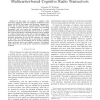175 search results - page 26 / 35 » Adaptive spectrum sensing for agile cognitive radios |
ICC
2007
IEEE
14 years 2 months ago
2007
IEEE
— For cognitive radio networks, a popular approach to dynamic spectrum allocation (DSA) is game theoretic, which improves spectrum efficiency in a distributed manner. In a doubl...
ICASSP
2011
IEEE
12 years 11 months ago
2011
IEEE
In Cognitive Radio (CR) systems, spectrum sensing plays a key role to determine the free frequency bands. However, when the primaryuser (PU) signal spectrum exhibits localized fad...
VTC
2010
IEEE
13 years 5 months ago
2010
IEEE
Cognitive radios are devices capable of sensing a large range of frequencies in order to detect the presence of primary networks and reuse their bands when they are not occupied. D...
ICC
2007
IEEE
14 years 2 months ago
2007
IEEE
—The discrepancy between perceived spectrum shortage from the FCC allocation map and the actual abundance of available spectrum is a motivation for Cognitive Radios, which locate...
VTC
2006
IEEE
14 years 1 months ago
2006
IEEE
— In this paper, we evaluate a cognitive radio transceiver employing both non-contiguous multicarrier modulation (NC-MCM) and adaptive bit allocation. Although NCMCM and bit allo...

